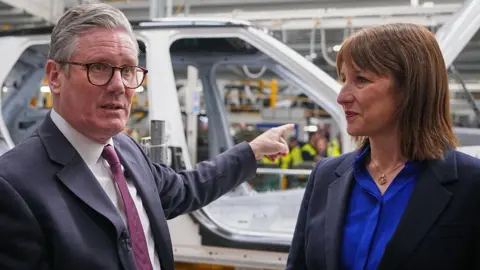In a stark indicator of the challenges facing the automotive sector, British car and van production has plummeted to its lowest level since 1953, a year that stands out mainly due to its historic circumstances. This decline highlights the mounting pressures from various factors affecting the industry, including economic uncertainties and global supply chain disruptions. According to the Society of Motor Manufacturers and Traders (SMMT), this downturn occurred during the first half of 2025, excluding the operational hiatus experienced during the COVID-19 pandemic.
The statistics depict a troubling narrative for the UK vehicle manufacturing landscape. Car production experienced a significant decline, falling by 7.3% during the six months leading up to June. Contributing to this bleak figure was the closure of Vauxhall’s Luton van plant, which resulted in a staggering 45% drop in van output. These numbers point to a broader trend affecting manufacturers across the United Kingdom, leading to an overall atmosphere of uncertainty and hesitation within the automotive market.
A significant element influencing this situation is the unpredictability surrounding tariffs in the United States—the UK’s second-largest market for vehicles. This uncertainty has prompted some manufacturers to either slow down or halt production entirely in the early months of 2025. However, the SMMT has cautiously optimistic views about the recent US-UK tariff deal, believing that it could restore some confidence within the industry. The UK government has also introduced electric vehicle (EV) grants, which officials stated would “boost” the automotive sector in response to these ongoing challenges.
Despite the introduction and anticipated benefits of EV grants, the SMMT expressed concerns regarding the clarity of the new support system. Notably, these grants were put in place without prior consultation with the industry, leading to further confusion among stakeholders. Mike Hawes, the chief executive of SMMT, characterized the production figures as “depressing” while harboring hope that these figures represent “the nadir” for the UK auto industry.
One notable development was the announcement of a tariff reduction deal that took effect on June 30, reducing tariffs from 27.5% to 10%. This agreement seemingly coincided with a slight uptick in vehicle production in June, providing a glimmer of hope for the beleaguered industry.
Looking ahead, the SMMT remains skeptical regarding a return to the production levels observed in 2021, where nearly a million vehicles were manufactured. Mr. Hawes acknowledged the government’s ambitious target of producing 1.3 million vehicles annually by 2035, emphasizing the necessity for at least one or potentially two new entrants in UK production to meet this goal. Meanwhile, production of electrified vehicles showed a modest increase of 1.8%, indicating a growing market segment, as battery-electric, hybrid, and plug-in hybrid vehicles comprised a record of more than two-fifths of total output.
In an effort to revitalize the industry, the government recently confirmed the reintroduction of grants amounting to up to £3,750 for certain EVs priced at or below £37,000. While the return of these incentives was welcomed, widespread confusion persists regarding the eligibility of specific vehicles for the discounts. The rebates are set to be influenced by the carbon emissions produced during vehicle and battery manufacturing. However, further clarity on eligible models and brands remains elusive, straining consumer confidence.
This uncertainty is compounded by concerns that vehicles from key markets, including China and South Korea, may not meet the newly defined criteria. Mr. Hawes articulated this confusion, noting that both dealers and consumers struggle to ascertain which vehicle models would qualify for the grants, creating unnecessary obstacles during one of the peak times for new car registrations in September.
Government representatives are optimistic, projecting dozens of models to be eligible for the grant scheme, which they claim would significantly benefit the industry and assist consumers financially. Importantly, the £650 million allocated for grants will be distributed on a first-come, first-served basis, placing additional pressure on manufacturers and consumers alike.
In conclusion, the current landscape of the UK automotive industry paints a picture of both significant challenges and tentative solutions, with a palpable need for transparency and support as manufacturers navigate this turbulent period.












